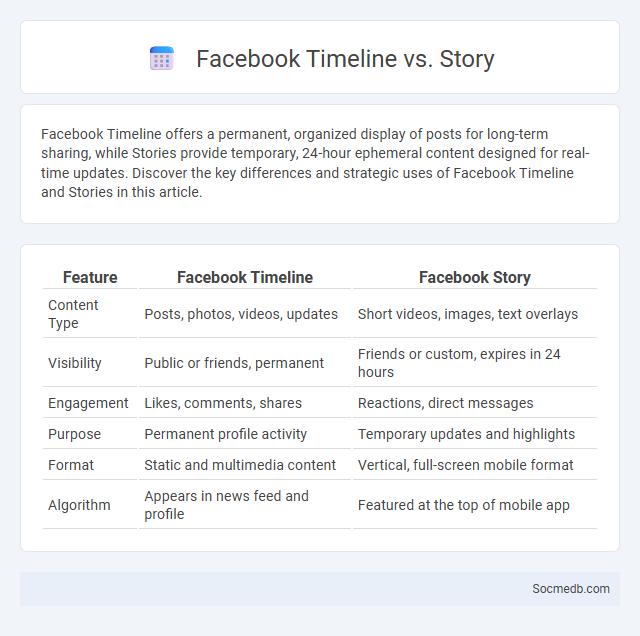
Photo illustration: Facebook Timeline vs Story
Facebook Timeline offers a permanent, organized display of posts for long-term sharing, while Stories provide temporary, 24-hour ephemeral content designed for real-time updates. Discover the key differences and strategic uses of Facebook Timeline and Stories in this article.
Table of Comparison
| Feature | Facebook Timeline | Facebook Story |
|---|---|---|
| Content Type | Posts, photos, videos, updates | Short videos, images, text overlays |
| Visibility | Public or friends, permanent | Friends or custom, expires in 24 hours |
| Engagement | Likes, comments, shares | Reactions, direct messages |
| Purpose | Permanent profile activity | Temporary updates and highlights |
| Format | Static and multimedia content | Vertical, full-screen mobile format |
| Algorithm | Appears in news feed and profile | Featured at the top of mobile app |
Introduction to Facebook Timeline and Story
Facebook Timeline serves as a dynamic digital archive showcasing users' personal history, key life events, and shared content in chronological order. Stories on Facebook provide a temporary, engaging format for users to share photos and videos that disappear after 24 hours, fostering real-time interaction and casual updates. Both features enhance user connection by blending permanent memories with ephemeral, everyday moments.
Key Features of Facebook Timeline
Facebook Timeline offers a dynamic way to showcase your life events, photos, and posts in chronological order, enabling easy navigation through your personal history. Interactive features such as tagging friends, sharing updates, and adding life events enhance engagement and storytelling. Your Timeline also allows control over privacy settings for each post, ensuring a tailored sharing experience that puts you in charge of your digital narrative.
Key Features of Facebook Story
Facebook Stories offer key features such as ephemeral content that disappears after 24 hours, interactive stickers including polls and questions to boost engagement, and creative tools like filters, text, and drawing options. You can share photos, videos, or Boomerangs directly to your story, which appears prominently at the top of the news feed and is viewable by your friends or followers. These features allow you to share moments in real-time and connect with your audience dynamically and visually.
Timeline vs Story: Core Differences
The core differences between Timeline and Story on social media lie in their content duration and presentation; Timeline posts are permanent and organized chronologically for long-term visibility, while Stories are temporary, disappearing after 24 hours and displayed in a slideshow format. Timeline content often supports in-depth engagement with comments and shares, whereas Stories emphasize real-time interaction through features like polls, stickers, and direct messaging. These distinctions influence user behavior, content strategy, and platform algorithms that prioritize Story engagement for immediacy and Timeline for sustained presence.
Content Longevity: Timeline vs Story
Content longevity varies significantly between social media timelines and stories, with timelines offering permanent visibility while stories disappear after 24 hours. Your timeline posts accumulate engagement over time, enhancing long-term reach and discoverability through algorithms and hashtags. Stories provide immediate, ephemeral interactions that boost real-time engagement but lack lasting presence on your profile.
Audience Engagement: Which Is Better?
Audience engagement on social media depends on your content's relevance and interaction strategies, such as polls, questions, and personalized responses that foster community. Platforms like Instagram and TikTok excel in visual content engagement, while Twitter and LinkedIn are strong for real-time conversations and professional networking. Your choice should align with your target audience's preferences and the type of engagement you want to achieve for optimal results.
Privacy Settings: Timeline vs Story
Managing your privacy settings on social media is crucial to controlling who sees your Timeline posts versus your Stories. Timeline posts typically remain visible on your profile until you delete them, allowing for a more permanent audience and requiring careful adjustment of privacy controls to protect your personal information. Stories, on the other hand, disappear after 24 hours and offer granular privacy options like hiding from specific users, enabling you to share more spontaneous moments with selected friends or followers.
Use Cases: When to Use Timeline or Story
Timeline is ideal for sharing evergreen content, important updates, or detailed posts that remain relevant over time, allowing your audience to engage at their convenience. Story features are best used for time-sensitive, behind-the-scenes glimpses, or interactive content that encourages immediate responses and temporary engagement. Your choice depends on whether you want to foster lasting visibility with Timeline or drive quick, ephemeral interactions through Stories.
Tips for Maximizing Timeline and Story Impact
To maximize timeline and story impact on social media, post consistently during peak engagement hours tailored to your target audience's activity patterns. Utilize high-quality visuals and compelling captions with relevant hashtags to increase reach and interaction. Engage with followers promptly through comments and direct messages to foster community and boost algorithmic favorability.
Conclusion: Choosing the Right Facebook Feature
Selecting the right Facebook feature enhances your social media strategy by aligning tools with specific goals like engagement, brand awareness, or customer support. Utilizing features such as Facebook Groups, Marketplace, or Live Video can optimize your reach and interaction with your target audience. Your choice should reflect your business objectives to maximize impact and foster meaningful connections.
 socmedb.com
socmedb.com